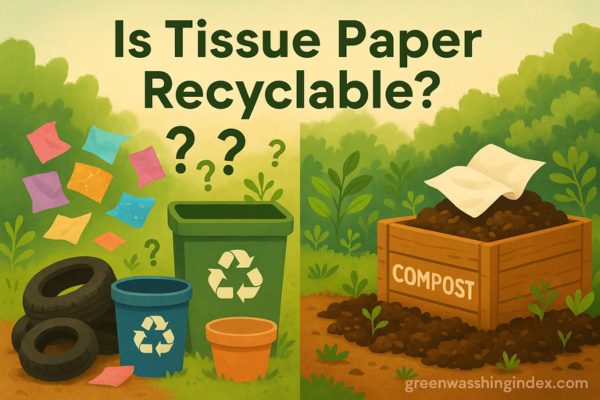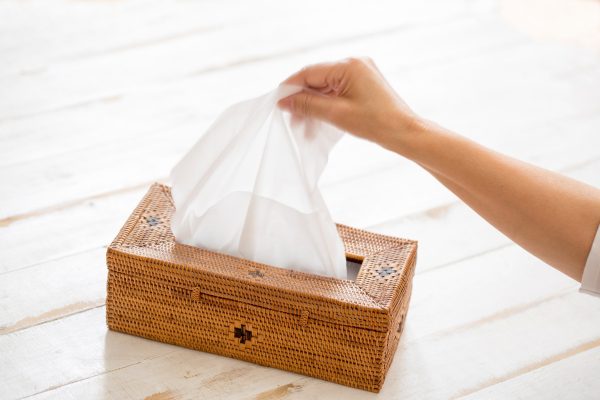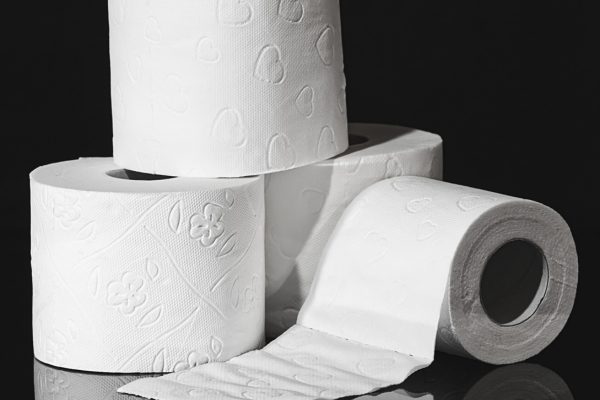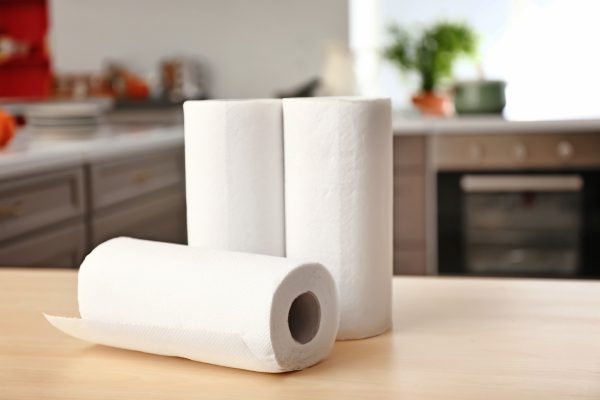

Standing in front of your recycling bin with a handful of crumpled tissue paper, you’re not alone in wondering whether it belongs with your recyclables or in the trash. The conflicting information about tissue paper recycling creates genuine confusion for environmentally conscious consumers trying to make the right choice.
Here’s the straightforward answer: tissue paper is technically recyclable, but whether your local facility accepts it depends on contamination levels and their processing capabilities. The thin, delicate nature of tissue paper combined with common decorative elements like glitter or foil often makes recycling impractical or impossible.
The good news? There’s a simple test you can perform right now to check if your tissue paper is recyclable. Plus, even when recycling isn’t an option, composting often provides an excellent eco-friendly alternative that many people overlook.
This comprehensive guide will walk you through everything you need to know about tissue paper disposal: the factors affecting recyclability, how to test your tissue paper, local recycling variations, composting methods, and creative reuse ideas that keep tissue paper out of landfills.
The recyclability of tissue paper isn’t a simple yes or no answer. Clean, unadorned tissue paper without glitter, foil, or plastic coatings can technically be recycled. However, many recycling facilities don’t accept it due to practical processing challenges.
Quick Reference Checklist:
The “it depends” nature of tissue paper recycling stems from multiple factors. Your local recycling program’s capabilities, the specific type of tissue paper, and contamination levels all play crucial roles in determining whether your tissue paper can be recycled.
Most importantly, even when tissue paper is technically recyclable, many facilities choose not to accept it. This decision often comes down to economics and equipment limitations rather than the material’s inherent recyclability.

Every time paper gets recycled, its fibers become shorter and weaker. Since tissue paper is often made from already-recycled paper, its fibers have reached the end of their useful life. These ultra-short fibers can’t bond properly during the recycling process to create new paper products.
Think of it like trying to make rope from threads that are already frayed and broken. The recycling process requires fibers of a certain length to create strong, usable paper. Tissue paper simply doesn’t meet this requirement.
Materials recovery facilities (MRFs) report that tissue paper’s thin, flimsy nature makes it nearly impossible to sort efficiently. It can slip through sorting screens designed for sturdier papers or contaminate other recyclable streams.
Contamination represents the biggest obstacle to tissue paper recycling. Even small amounts of non-recyclable materials can ruin entire batches of otherwise recyclable paper. Common tissue paper contaminants create significant problems for recycling facilities.
Glitter, despite its festive appeal, consists of tiny plastic particles that cannot be removed during recycling. A single piece of glittered tissue can contaminate thousands of pounds of recyclable paper. Similarly, metallic foils and plastic coatings make tissue paper completely non-recyclable.
Real-world examples highlight these challenges. Gift-wrapping tissue often contains petroleum-based inks, adhesive residues from tape, or invisible plastic coatings that prevent proper recycling. Even natural-looking tissue paper might have treatments that disqualify it from recycling programs.
Food residue, makeup, and oils absorbed by tissue paper create additional contamination issues. Unlike regular paper recycling, where minor contamination can sometimes be managed, tissue paper’s absorbent nature makes it particularly problematic.
The economics of tissue paper recycling rarely make financial sense for processing facilities. As a low-grade material, tissue paper commands minimal market value compared to cardboard or office paper. Buyers for recycled tissue paper pulp are scarce.
Sorting tissue paper requires specialized equipment and manual labor that many facilities lack. The cost of separating tissue paper from other materials often exceeds any potential revenue from selling the recycled material. This economic reality leads many recyclers to reject tissue paper entirely.
Additionally, the energy and water required to process contaminated tissue paper can be substantial. When facilities calculate the environmental and financial costs versus benefits, tissue paper recycling often doesn’t add up.
The scrunch test offers a simple way to determine if your tissue paper might be recyclable. This quick assessment helps identify tissue paper with plastic coatings or other non-recyclable treatments that aren’t always visible to the naked eye.
How to Perform the Scrunch Test:
Results that indicate recyclability include tissue paper that remains in a compressed ball and feels purely papery without any slick or shiny texture. The paper should tear easily without stretching when pulled.
Non-recyclable indicators include tissue that immediately unfolds, feels waxy or plasticky, stretches instead of tearing cleanly, or has visible shimmer beyond normal dye. These characteristics suggest treatments that prevent recycling.
Common mistakes include testing wet tissue paper (always test dry), assuming all plain-looking tissue is recyclable, or ignoring local guidelines even when tissue passes the test. Remember, passing the scrunch test doesn’t guarantee your local facility accepts tissue paper.
Understanding what makes tissue paper recyclable helps you make better purchasing and disposal decisions. Recyclable tissue paper shares several key characteristics that distinguish it from non-recyclable varieties.
Plain, uncoated tissue paper without any special treatments typically qualifies for recycling where accepted. This includes white or naturally dyed tissue made from pure paper fibers. The simpler the tissue paper, the more likely it can be recycled.
Acid-free tissue paper, often used for archival storage or high-quality gift wrapping, represents the gold standard for recyclability. These papers use acid-free processing that creates a pure, compostable product without harmful chemical residues.
| Recyclable Features | Why It Matters |
|---|---|
| Soy-based inks | Biodegradable, non-toxic |
| Water-based dyes | Easy to remove in recycling |
| Natural fibers only | No synthetic contamination |
| Acid-free processing | Pure paper product |
Several tissue paper types should never enter your recycling bin due to coatings, treatments, or decorative elements. Recognizing these varieties helps prevent contamination of recyclable materials.
Metallic or foil tissue papers contain thin metal layers or metallic inks that cannot be separated during recycling. These shiny papers might look festive, but they belong in the trash. Even tissue paper with small metallic accents should be kept out of recycling.
Glitter represents another major recycling contaminant. Those sparkly bits are actually microplastics that persist in the environment and ruin recycling batches. Any tissue with glitter, no matter how sparse, cannot be recycled or composted.
Common Non-Recyclable Types:
The acceptance of tissue paper in recycling programs varies dramatically across regions. What’s recyclable in one city might be trash in another, making local knowledge essential for proper disposal.
According to recycling industry data, approximately 62% of U.S. communities accept some form of paper recycling, but tissue paper acceptance is much lower. Major cities show striking differences in their tissue paper policies.
For example, San Francisco residents must compost their tissue paper, while Austin, Texas allows it in recycling bins. Boulder County, Colorado specifically requests residents landfill tissue paper, yet neighboring Larimer County accepts it for recycling.
To check your local guidelines, start with your municipality’s waste management website or call their recycling hotline. Look for specific mentions of tissue paper, gift wrap, or lightweight papers. Many programs that accept mixed paper still exclude tissue paper.
When recycling isn’t accepted locally, don’t resort to “wishcycling” by tossing tissue paper in anyway. This well-intentioned mistake contaminates other recyclables and can cause entire loads to be rejected.

Composting often provides a superior disposal method for tissue paper compared to recycling. While recycling faces numerous technical and economic challenges, composting works naturally with tissue paper’s properties.
Tissue paper serves as an excellent carbon-rich “brown” material in compost systems. It balances nitrogen-heavy food scraps and green waste, creating ideal conditions for decomposition. Unlike recycling, composting doesn’t require long fibers or contamination-free material.
The decomposition timeline for tissue paper impresses even experienced composters. In well-managed compost piles, tissue paper can break down completely within 2-6 weeks. This rapid decomposition returns nutrients to soil rather than occupying landfill space.
Environmental benefits extend beyond waste reduction. Composted tissue paper improves soil structure, retains moisture, and supports beneficial microorganisms. These advantages make composting particularly attractive for gardeners and environmentally conscious households.
Home composting of tissue paper requires minimal preparation but yields excellent results. Following proper techniques ensures efficient decomposition and high-quality compost for your garden.
Preparation Steps for Composting:
Avoid composting tissue paper with synthetic coatings, metallic elements, or heavy chemical dyes. Used facial tissues can be composted if you’re comfortable with it, though some prefer to exclude them for hygiene reasons.
Proper ratios matter for efficient composting. Aim for roughly 3 parts brown materials (including tissue paper) to 1 part green materials. Too much tissue paper at once can mat together, so distribute it throughout your pile.
For faster decomposition, keep your compost moist like a wrung-out sponge and turn it regularly. Shredded tissue paper mixed with food scraps and yard waste typically disappears within a month in active compost systems.
Commercial composting facilities offer advantages over home composting for certain tissue paper types. These facilities maintain higher temperatures and controlled conditions that break down materials more efficiently.
Industrial composters often accept tissue paper that home systems cannot handle, including lightly dyed varieties and larger quantities. Their high-temperature processes can break down some inks and treatments that persist in backyard bins.
Many communities with limited recycling options provide industrial composting as an alternative. Check with your local waste management authority about commercial composting availability. Some areas offer curbside collection specifically for compostable materials.
To find facilities near you, search online directories for “commercial composting near me” or contact your city’s environmental services department. Many facilities provide detailed lists of accepted materials including specific tissue paper guidelines.
Following a systematic approach ensures your tissue paper disposal aligns with environmental best practices and local regulations. This process eliminates guesswork and prevents contamination of recycling streams.
Complete Disposal Process:
Each step plays a crucial role in proper disposal. Skipping assessment might lead to recycling contamination, while ignoring local guidelines could result in rejected materials or fines.
Remember that reuse always trumps disposal. Before following these steps, consider whether the tissue paper could serve another purpose in your home or garden.
Extending tissue paper’s useful life through creative reuse represents the most environmentally friendly option. These ideas transform potential waste into functional or decorative items for your home.
Gift wrapping alternatives include smoothing and storing tissue paper for future presents. Iron wrinkled tissue between cloth on low heat to restore its appearance. Layer different colors for unique gift presentations.
Craft Project Ideas:
Tissue paper serves excellently as packing material for fragile items. Its cushioning properties protect delicate objects during moves or storage. Acid-free tissue specifically helps preserve vintage clothing and documents.
Garden applications include using tissue as mulch for container plants or seed-starting pots. Plain tissue paper can line the bottom of planters to prevent soil loss while allowing drainage.
Making sustainable choices starts with selecting better alternatives to traditional tissue paper. These options provide similar functionality while eliminating disposal concerns.
Recyclable wrapping options include kraft paper, newspaper, and brown paper bags. These materials accept decoration with stamps or drawings while maintaining recyclability. Many feature attractive textures and colors naturally.
| Alternative | Benefits | Best Use |
|---|---|---|
| Fabric wraps (Furoshiki) | Reusable, beautiful | Special gifts |
| Newspaper | Free, recyclable | Casual wrapping |
| Brown kraft paper | Sturdy, customizable | All occasions |
| Beeswax wraps | Reusable, compostable | Food gifts |
| Seed paper | Plantable | Eco-conscious recipients |
Biodegradable tissue brands now offer products made from bamboo, recycled content, or agricultural waste. These papers often use vegetable-based inks and acid-free processing for optimal compostability.
DIY sustainable options let you create custom wrapping from materials at hand. Old maps, sheet music, children’s artwork, or fabric scraps provide unique, personal touches while reducing waste.
Understanding common recycling mistakes helps prevent contamination and improves overall recycling program effectiveness. These errors, though well-intentioned, can cause significant problems for recycling facilities.

Mixing contaminated tissue with clean recyclables ranks as the most damaging mistake. One piece of glittered tissue can contaminate an entire recycling bin, forcing everything to landfill. Always separate questionable tissue from confirmed recyclables.
Not checking local rules leads to improper disposal and potential program violations. Assuming all paper products are recyclable ignores the specific limitations many programs face with tissue paper. Verify guidelines before recycling.
Critical Mistakes to Avoid:
Wishcycling – placing items in recycling hoping they’ll be processed – creates more harm than good. When in doubt, choose composting or trash over potentially contaminating recyclable materials.
The environmental consequences of improper tissue paper disposal extend far beyond individual households. Understanding these impacts motivates better disposal practices and informed purchasing decisions.
Landfill consequences include methane production as tissue paper slowly decomposes without oxygen. This potent greenhouse gas contributes significantly to climate change. Tissue paper in landfills also represents wasted resources and energy.
Recycling contamination from improper tissue paper disposal costs facilities millions annually. Contaminated loads must be landfilled, negating the environmental benefits of other properly sorted materials. This hidden cost affects recycling program viability.
Benefits of proper disposal include resource conservation, reduced greenhouse gas emissions, and improved soil health through composting. Every properly disposed tissue paper contributes to circular economy principles and waste reduction goals.
Carbon footprint considerations reveal that composting tissue paper produces significantly lower emissions than landfilling. Even when recycling isn’t viable, choosing compost over trash makes a measurable environmental difference.
Facial tissues and paper towels require different handling than decorative tissue paper. These hygiene products cannot be recycled due to contamination and hygiene concerns, regardless of local recycling capabilities.
Used tissues contain bodily fluids, making them unsuitable for recycling systems designed for clean paper. The potential for disease transmission and contamination means these always belong in the trash. Paper towels face similar restrictions.
Composting considerations for facial tissues depend on personal comfort levels and composting system type. While technically compostable, many people prefer excluding used tissues from home compost. Industrial composting facilities’ high temperatures better handle potential pathogens.
Unused facial tissues and paper towels can theoretically be composted if unbleached and fragrance-free. However, their design for absorbency means they often contain additives that slow decomposition.
Understanding the distinctions between gift wrap and tissue paper prevents disposal confusion. While both serve decorative purposes, their composition and recyclability differ significantly.
Gift wrap often contains plastic films, heavy inks, and non-paper materials that make recycling impossible. The wrapping paper recycling test (similar to tissue’s scrunch test) helps identify recyclable varieties.
Key Differences:
| Feature | Tissue Paper | Gift Wrap |
|---|---|---|
| Material thickness | Very thin | Medium to thick |
| Typical coatings | Sometimes | Often |
| Recyclability | Limited | Varies widely |
| Compostability | Often possible | Rarely possible |
| Reuse potential | Moderate | High |
Shopping tips include choosing plain papers without coatings, buying recyclable or compostable options when possible, and considering reusable alternatives for both tissue and wrapping paper needs.
Tissue paper with tape attached cannot be recycled. The adhesive contaminates recycling equipment and prevents proper paper processing. Always remove all tape, stickers, and adhesive residues before attempting to recycle or compost tissue paper.
Small tape remnants might seem insignificant, but they cause problems during pulping. If you can’t remove all tape cleanly, dispose of the tissue paper in trash rather than risk contaminating recyclables.
Colored tissue paper’s recyclability depends on the dye type and intensity. Lightly colored tissue using water-based dyes may be recyclable where tissue paper is accepted. However, deeply saturated colors often indicate dyes that complicate recycling.
Dark or vibrant colors suggest high dye content that many facilities cannot process. When in doubt, compost colored tissue paper instead, as the dyes break down naturally in composting systems.
Whether tissue paper belongs in your blue recycling bin depends entirely on local program rules. Many curbside programs specifically exclude tissue paper even when they accept other paper products. Check your local guidelines rather than assuming.
If your program doesn’t explicitly mention tissue paper, contact them directly. Putting tissue paper in the blue bin without verification risks contaminating other recyclables and potentially having your entire bin rejected.
Tissue paper decomposes relatively quickly compared to other paper products. In a landfill without oxygen, decomposition takes 2-6 weeks. In a properly managed compost pile, tissue paper can break down in as little as 2-4 weeks.
Factors affecting decomposition include moisture levels, temperature, and whether the tissue contains synthetic materials. Plain tissue paper in ideal composting conditions essentially disappears within a month.
In landfills, tissue paper undergoes anaerobic decomposition, producing methane gas as it breaks down without oxygen. This process contributes to greenhouse gas emissions and represents a missed opportunity for beneficial reuse.
While tissue paper decomposes faster than many materials, landfilling still wastes potential resources. The nutrients locked in tissue paper could enrich soil through composting instead of generating harmful gases in landfills.
The question “is tissue paper recyclable” doesn’t have a simple universal answer. While technically recyclable when free from contaminants, practical challenges mean many recycling facilities cannot or will not accept tissue paper. Your local guidelines ultimately determine the right disposal method.
The key takeaway: always check your local recycling rules before disposing of tissue paper. What works in one community may not apply in another. When recycling isn’t an option, composting provides an excellent alternative that benefits your garden and the environment.
Making sustainable choices extends beyond disposal. Consider reusing tissue paper, choosing eco-friendly alternatives, or reducing packaging waste altogether. Every small action contributes to larger environmental benefits.
Your next step? Perform the scrunch test on tissue paper in your home, check local guidelines, and set up a simple composting system if you haven’t already. These small changes in how you handle tissue paper can make a meaningful difference in reducing waste and protecting our environment.
